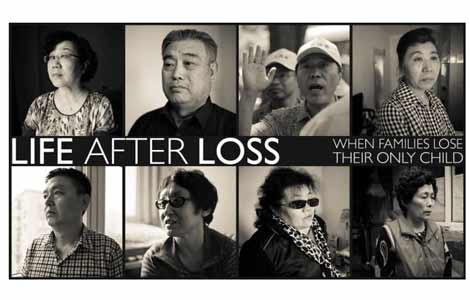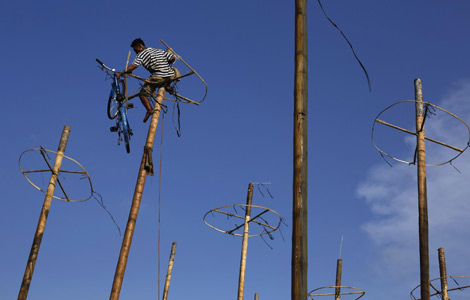The homeless reveal loose ends of China's urbanization
Updated: 2013-10-03 14:10
(Xinhua)
|
|||||||||||
BEIJING -- Xiaoxiao dashed around his mother, twisting through the crowd for recyclable bottles and hovering expectantly as people nearby drank the last drops of their beverages.
At seven, the tanned, skinny boy is already the right hand of his mother, Yan Chunhua, a bottle collector outside the Beijing West Railway Station.
The duo scavenge around the station every day and sleep in the square outside at night. They are among the station's sizable group of homeless dwellers who grind out a meager living by begging and scavenging.
|
Find more in
|
Xiaoxiao has no family name -- his father disappeared after raping his mother, who was at that time roaming the Beijing streets after her sister-in-law drove her out of her home in rural Hebei province.
Upon arrival, Yan believed the glitzy metropolis was a land of opportunity, but she soon realized the city, known for its exorbitant house prices and living costs, had no room for a penniless single mother.
"We are not even welcomed at the square. Some scrap collectors threatened they would hurt us if we stepped into their turf," said the 45-year-old woman.
The mother and son make a living by collecting empty bottles and selling them to salvage stations. On their best day, they collected 80 bottles, which brought in an income of roughly six yuan (98 U.S. cents).
"Some people told me begging would bring me more money, but I just can't kneel at the roadside with my son begging for mercy. I don't want him to become a beggar," the mother said.
Yan had considered schooling for Xiaoxiao, but eventually gave up the idea as Beijing's public schools only enroll children with residential status, and tuition at private institutions is far beyond their means.
"I heard even many children of white-collar parents can't go to school, let alone Xiaoxiao."
Like Yan, many homeless here are former farmers who have failed to find jobs in the city. Lacking a Beijing "hukou," or residential status, they do not qualify for the basic living subsidies or other welfare benefits provided by the city.
Sociologists said the increasing urban homeless population has become a prominent issue as China experiences rapid urbanization, which has sent massive waves of rural people into cities.
"Many rural residents who flock to cities are unskilled or unable to adapt to urban life. They can't find jobs like other migrant workers and thus become homeless," said Xia Xueluan, sociology professor with Peking University.
"Meanwhile, many cities are not well-prepared. Their governments lack effective measures, like job training, to properly handle this group of people," Xia said.
Related Stories
Conference focuses on new energy, green economy 2013-09-27 08:44
Technology and the new urban China 2013-09-27 07:07
China to boost urban infrastructure 2013-09-17 09:03
Farsighted urban planning 2013-09-18 07:49
Migrants in urbanization 2013-09-12 07:34
Today's Top News
A community of common destiny with ASEAN
Shutdown still in deadlock after talks
UNSC urges boost to Syria aid access
Russian embassy in Tripoli attacked
Iran has proposal for nuclear deal
Xi opens up on hopes for football World Cup glory
Trending news across China
President Xi meets Indonesian counterpart on ties
Hot Topics
Lunar probe , China growth forecasts, Emission rules get tougher, China seen through 'colored lens', International board,
Editor's Picks

|

|

|

|

|

|






